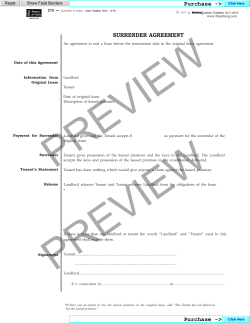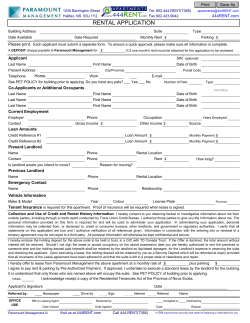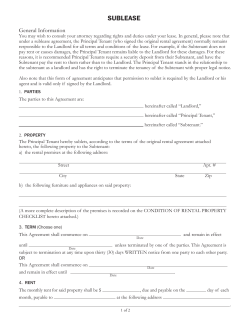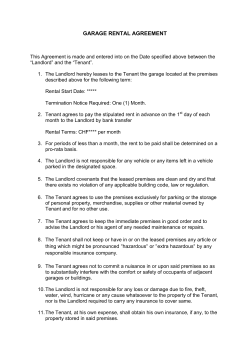
Landlord-Tenant Rights
Landlord-Tenant Rights The Written Lease A lease is a contract whereby the landlord (lessor) agrees to permit a tenant (lessee) to have possession of his/her property for a fixed period of time. In exchange, the tenant must make a payment of rent and carry out non-monetary obligations of the lease. As long as a tenant complies with provisions of the lease and pays his/her rent on time, the landlord may not sue him/her for money or evict him/her from the property. A lease is difficult for most people to understand because of its technical language. Fearful of not getting their apartment, students (in particular) often sign the lease without studying it carefully. If at all possible, have an attorney or Group Legal Services check out your lease before signing it. You and your prospective landlord may agree to add, remove or modify certain clauses prior to signing the agreement. Be wary of the "standard" lease. Before signing the lease, you should demand an exact written copy. All parties must sign in order for the lease to be binding. Your lease must be written in "plain language" under New York State law, but the plain language lease is weighed heavily in favor for the landlord. If you and your co-tenants sign the lease, you are all equally liable for the entire amount. If you can get your landlord's consent specifying that each tenant is only responsible for his/her own portion of the rent, you have decreased your liability significantly. Anything not written in the lease, yet promised by your landlord, will be difficult or impossible to enforce. Try to get all the agreements in writing, especially those promises by the landlord regarding repairs that will be made in the future. The main advantage of a written lease is a certainty of the amount of rent for the period specified. The major disadvantage for the student is that the student may want to change living arrangements during the school year. The lease rarely takes these problems into consideration – and makes a lease nearly impossible to break! Unwritten Leases Many students enter verbal agreements on a periodic basis – weekly or monthly. A week-to-week or month-to-month agreement is renewed each time the tenant pays his rent. Either party, with 30-day notice, can terminate the month-to-month agreement. If you are paying rent on the first of every month and on the ninth of the month, your landlord serves you with notice to vacate, you must vacate by the end of the following month. Since you've already paid this month's rent, the 30-day notice applies to next month's rent. Notice doesn't apply to the current month if you've already paid the rent without notice to vacate. Notice can be verbal, but for safety, notices should be written and mailed via "Certified Return Receipt". A termination doesn't require that there be any reason or violation of the lease. Once you have given proper notice to the landlord of you intention to leave the premises, you may not change your mind and remain with a new agreement with the landlord. A lease for longer than one year must be in writing. The amount of payment you give to the landlord should be clear and specific. You should have a clear agreement when payment is due. New York State law requires that the landlord give you a receipt for 1 each payment, and for the security deposit, if paid in cash. If you have a month-to-month or oral lease, the landlord must give proper notice of an increase in rent, usually 30 days. There are only limited circumstances when rent may be properly withheld. Students should consult Group Legal Services or an attorney when contemplating such action. Changes to rental agreements are not enforceable unless both sides agree. Rent regulation may also prohibit changes to the agreement. In the absence of an agreement to raise the rent, an owner can either accept the lesser rent or give a notice to terminate such a periodic tenancy, at least thirty days before the final day of the next monthly term. Sub-Letting Sub-letting is a situation where a tenant, who holds a dwelling unit through either a written or oral lease for a specific period, rents out the premises to another party for a period during his own term of occupancy. A sub-lease may either be written or oral, except if the sub-lease exceeds one year, in which case the agreement must be in writing. The original "prime" tenant remains responsible to the landlord for rent and damages even if the sub-letter pays directly to the landlord. Prime tenants are well advised to obtain a substantial security deposit in order to cover the possibility that the sub-letter may fail to fulfill his/her part of the agreement. Students under written leases should review the terms of the lease regarding the right to sub-let. A presumed "right to sub-let" under New York State law applies only to buildings of six or more independent units. Renter's Insurance Tenants are strongly encouraged to obtain renter's insurance – most policies held by parents do not cover their children away from home. Renter's policies cover such things as theft, fire, and water damage. The average minimum policy has a premium of little more than $100.00 for $12,000 worth of coverage. And one can never be too prepared. Landlord-Tenant Responsibilities The bedroom ceiling leaks. The bathroom sink is clogged. Invading cockroaches have infiltrated the kitchen cabinets and look to conquer the pantry. Welcome to the world of off-campus housing! Of course, poor housing conditions don't exist everywhere. Furthermore, such conditions are not always the landlord's responsibilities. Legislation has been passed at all levels of government to insure minimal housing standards. Note: The following general principles apply to all housing. The technical specifications given are applicable to the City of Buffalo. If you live outside of the city limits, check for the appropriate specifications within your town. Landlord Responsibilities Security Deposit: 2 The law requires all landlords, regardless of the number of units in the building, to treat the deposits as trust funds belonging to the tenants. Landlords are prohibited from inter-mingling deposits with their own money. Landlords of buildings with six or more units must put all security deposits in a New York bank account that earns interest at the prevailing rate. The landlord must return the security deposit and any accumulated interest, less any lawful destruction, to the tenant at the end of the lease or within a reasonable period of time thereafter. A landlord may use the security deposit only: 1. A reimbursement for the reasonable cost of repairs beyond normal wear and tear, if the tenant damages the dwelling unit 2. As reimbursement for any unpaid rent Electricity: The landlord must provide the proper number of electrical outlets whether electricity is included in the rent or not. There must be a minimum of one outlet per 120 square feet of area. Another outlet is required for each additional 100 feet or any portion thereof. Heat: The landlord must provide a heating system capable of heating all habitable rooms to at least 72 degrees (Fahrenheit) at an outside temperature of –2 degrees (Fahrenheit), whether heat is including in rent or not. If heat is included in the rent, the landlord must provide heat to all habitable rooms at a minimum of 70 degrees (Fahrenheit) between 6 AM and 12 Midnight, and a minimum of 65 degrees (Fahrenheit) between 12 Midnight and 6 AM when the outside temperature is 55 degrees (Fahrenheit) or lower. Water: Every required plumbing facility must have an adequate supply of hot and cold running water. The landlord must provide a hot water tank that will heat water to a maximum of 150 degrees Fahrenheit and a minimum of 130 degrees. The tank must hold at least four gallons per occupant and furnish minimum capacity of 2,500 BTU recovery per hour per occupant. The landlord must also ensure that all plumbing fixtures are maintained properly. This includes unclogging any choked or stopped fixture due to any cause. Lighting and Ventilation: The landlord must provide a window or skylight (1/10 of total floor size) in every habitable room, unless he/she can provide five foot-candles of light by alternative means. There must be proper ventilation - six changes of air per hour that exhaust outside. Passageways and stairways in dwellings with three or more units must be adequately lighted and ventilated – three changes of air per hour that exhaust outside. Exits: In a building with two stories or less, the landlord must provide secondary exits (doors, panels, fire escapes) of some kind on each floor. These means of escape may never be blocked for any reason 3 by the landlord or by anyone else! Smoke detectors may not be legally mandated, but are strongly recommended protect occupants and landlord and tenant belongings. Privacy: If the unit has three or more rooms, the living room, bathroom and other rooms must be accessible without passing through a bedroom. Bathroom: The landlord must provide a bathroom with a toilet, sink, and either a bathtub or shower unit. All fixtures must be in good working condition. Floors should be of water repellant construction, and walls must be water-resistant. A window is not required if there is a proper mechanical ventilation system. However, there must be at least one lighting fixture and one electrical outlet. Kitchen: If there is a kitchen, the landlord must provide a sink of non-absorbent material and an approved gas or electrical supply for all appliances. Any combustible materials within one foot of a stove or other cooking device must be fire retardant (drapes, etc.). Surfaces: The landlord must keep all surfaces clean, safe, sanitary, and free of substantial damages. Exterior Surfaces The landlord must paint, side (or appropriate building material) to prevent building deterioration. In addition, any materials used to repair exterior surfaces must be equal in quality to the rest of the exterior surface; otherwise, the whole building must be restored to original conditions. Interior Surfaces The walls and ceiling must be painted or papered to insure sanitary conditions. Passageways and stairways in buildings with three or more apartment units must have fire retardant surfaces. Screens: The landlord must provide the first three stories of a building with #16 or finer mesh for all exterior opening from June 1st to October 1st. Premises: The landlord is responsible for keeping premises clean, safe in good repair, and free from vermin, rodents, filth, or garbage. Fences, steps, walkways, sidewalks, driveways, and yards must be maintained 4 properly. The landlord, however, may transfer the responsibility to mow the lawn, maintain the grounds, shovel show, etc. to the tenant through the lease or through an oral agreement. Warrant of Habitability: Under the New York State Real Property Law, every tenant has the right to be free of "dangerous, hazardous, or detrimental" conditions. If you have any questions regarding this warranty, please consult Group Legal Services or an attorney. Tenant Responsibilities Premises: Tenants must keep their part of the premises clean and sanitary. Misuse shared facilities is also a responsibility of the tenant. Facilities: Tenants must keep all supplied facilities (including plumbing fixtures and cooking equipment) clean and sanitary. Tenants must also exercise reasonable care in the use and operation of such facilities. Tenants may not deposit any material in a toilet, sink, or tub that could obstruct proper operation of a sewer. Exits: Tenants must keep all exits in their part of the premises clear at all times. Extermination: Tenants must exterminate any insects or rodents in their section of the premises if their part is the only infested area. Garbage: Tenants must dispose of garbage in a clean and sanitary manner, and keep all garbage facilities clean and sanitary. Tenants living in one or two family dwellings must provide their own garbage cans. Pets: If the landlord permits pets, tenants must keep them clean, sanitary, safe, quiet and under control. Screens: Tenants must handle the installation and removal of screens in their own part of the premises unless there is some agreement with the landlord. Maximum Occupancy: 5 Tenant must adhere to the maximum occupancy laws. In general, there cannot be more than one person per 100 square feet of floor area. Children under the age of two are not included. Generally, the attic and basement are not considered part of an apartment for purposes of calculating square footage. Repairs, Filing a Complaint What do you do if you find yourself in the midst of a Buffalo winter, freezing to death due to a lack of heat in your apartment? What do you do if the plumbing is clogged up because of the 16th-century vintage pipes that needed replacing in 1880? Try to discuss the matter with the landlord first, and ask him/her to make the necessary repairs. A written demand should follow if the landlord takes no action. If your complaint falls upon deaf ears or is met with unfulfilled promises to make amends, file a formal complaint. If the problem concerns health or safety, report the problem to the Erie County Health Department. Housing Code violations should be reported to the City Division of Housing and Building Inspectors. The responsibilities of the two departments overlap considerably. Erie County Health Department Health Information (716) 858-7690 City of Buffalo Department of Inspection (716) 851-4949 After you contact one of these agencies, an inspector will examine the premises. Remember to: 1. Arrange to be at your apartment or have a friend be there in order to draw attention to specific violations. 2. Have the inspector examine the ENTIRE unit and list each violation separately. 3. Get the inspector's name, and record the date of the inspection. 4. Request a copy of the inspector's report – if possible. When a violation is found, the inspector will notify the owner. In cases that aren't extreme emergencies, the landlord will be given 30 days to remedy the problem. The primary aim of the program is to induce voluntary compliance. Fines and imprisonment are used as a last resort. The Housing and Property Code makes the owner responsible for the elimination found on his/her premises, regardless of any lease between the owner and occupants. However, if the tenant has caused the problem, the provisions of these ordinances could be turned against the tenant. A second avenue is to seek monetary damages for the lack of services through Small Claims court. Most often, these claims seek to recover out-of-pocket expenses the tenant utilized to compensate for inadequate services. Going to Small Claims Court If you feel you have a valid claim and your landlord has not responded, you may attempt to recover the money in Small Claims court. Remember, if you are suing for repairs that you have made, you must have personally expended the money to make repairs before you have the right to file claim. Small Claims may 6 only hear cases that are under $3000.00. To file a claim, you must supply the name and exact address of the defendant (usually the landlord). The defendant must either be a resident within the jurisdiction of the court or have a place of business within the jurisdiction. Claims may be filed with the Small Claims Clerk. Call the office of the appropriate court for times of business and days when the court is available. The fee for filing a claim is the cost of registered mail service. Upon filing your claim, you will be assigned a hearing date. During the interim, the Clerk will send a summons by registered mail to the defendant, notifying him/her to appear at the hearing. The defendant, after being served, has the option of initiating a counterclaim. If such a counterclaim is initiated, the Clerk will notify you of the action, along with the amount of the counterclaim. More information about Small Claims and the process is available at Group Legal Services, 377 Student Union (Amherst Campus). How to Avoid Losing Your Security Deposit Tenants are usually required to pay a security deposit or damage deposit equivalent to one month of rent. This deposit should be refunded if there is no damage to the apartment or no additional rent is due. Most disputes over the damage deposit occurs because of a conflict in the memories of the landlord and the tenant as to the condition of the apartment when the tenant first moved in or in the conflicting definitions of damage and normal wear and tear. In order to prevent losing your damage deposit, do not leave anything to memory: 1. When you pay the deposit, make sure you receive a receipt specifying that the money is a damage deposit 2. Make a checklist of the condition of the apartment at the beginning of you tenancy and make sure you and the landlord both sign. Make a copy for both you and your landlord. It is helpful to either photograph or videotape the condition of the apartment at the time of the lease. 3. Arrange to meet with your landlord the last day you will be in the apartment so that you are both there to check the condition of the apartment against your checklist. Again, photograph or videotape the condition of the apartment. Try to arrange to have the landlord pay you the security deposit at the time of the final inspection. 4. If you are responsible for some damage to the apartment, offer to repair it yourself, if at all feasible; otherwise, you may be presented with an astronomical bill from a third-party. Always demand receipts for repair work that you have paid for. 5. If you feel that the landlord has improperly withheld all or part of you deposit, you may file you claim with Small Claims. If you receive a check for a portion of the security deposit and still feel that the landlord has improperly withheld money, you may cash the check and sue for the remainder through Small Claims, unless you have released the landlord from any further claims. 6. Security deposits are for damages and are not to be used as rent for your final month of occupation unless the landlord agrees! Evictions If a tenant defaults on the rent or remains longer than the term without the landlord's permission, the landlord may take legal action to have the former tenant removed (evicted). A landlord cannot deprive the tenant of the use of his/her apartment or remove property without a court order. For example: a landlord 7 cannot use threats of violence, remove a tenant's possessions, lock the tenant out of the apartment, or willfully discontinue services such as water or heat. The landlord must give the tenant written notice stating that the tenant has a certain number of days to pay the overdue rent or vacate (many times, this notice is provided for in the lease). If this deadline is not net, the landlord may begin eviction proceedings by going to court and filing for a warrant to evict, monetary damages and (possibly) attorney's fees. A copy of this legal notice is then served on the tenant. These papers must be served at least five days before a scheduled court hearing and will state the date, time, and place of the hearing. The tenant must then appear in court. If the tenant fails to appear in court, he/she will lose by default, and the landlord will obtain the writ of eviction and the other relief he/she requested. If the tenant contests the landlord's complaint, a hearing may be held at which time both parties must appear before the judge. If the court decides for the landlord, the court will then order a warrant of eviction to be issued. The landlord must purchase the warrant and deliver it to the marshal or sheriff to serve on the tenant. A landlord has 30 days from the date of appearance in court to have the warrant issued. Once the tenant is served with a warrant, he/she has 72 hours to vacate the premises. If the tenant has not vacated after 72 hours, the marshal or sheriff has the legal obligation to physically remove the tenant and his/her belongings from the apartment. Only a marshal or sheriff may legally remove a tenant! A tenant who is put of his/her apartment in a forcible, unlawful manner is entitled to recover treble damages in a legal action against the wrongdoer. Further, the tenant is entitled to be restored to occupancy. A tenant should never ignore legal papers, even if the tenant believes that he or she has been improperly served. The tenant must go to court when directed and immediately raise all defenses he or she might have. If a tenant ignores legal papers, the court might enter a default judgment against the tenant, award the owner a warrant of eviction, evict the tenant, and get a Marshal or Sheriff to seize the tenant's bank accounts, salary or other property. In addition, it is possible for the court to enter a money judgment against the tenant if the tenant does not appear in court when required. Packet Published 1996, 1999, 2001 Researched in 1996. Revised by Besty Snyder 1999, John Menard 2001. SBI Legal Assistance Director: Alex Melville 8
© Copyright 2025







![Sample Letter: Request for Deposit Return [Date] [Landlord/Manager’s Address]](http://cdn1.abcdocz.com/store/data/000031946_2-a5dff79aaa9f3543944111c0539def82-250x500.png)

